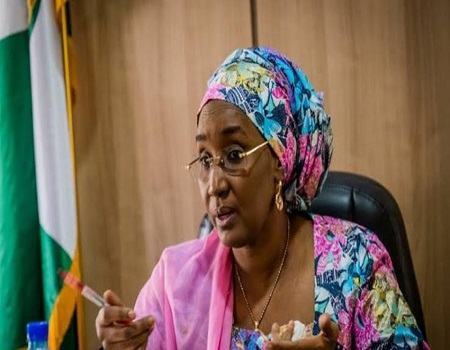Federal Government on Thursday disclosed that it has concluded plans to absorb one million youths into Batch ‘C’ of the N-Power scheme across the country, with the launch of the National Social Investment Management Systems (NASIMS).
The Minister of Humanitarian Affairs, Disaster Management and Social Development, Sadiya Umar Farouq who launched the programme in Abuja, tasked all Nigerians who applied for the N-Power programme to log into N-Power self-service portal on www.nasims.gov.ng and update their records, following which they may proceed to the mandatory online test in order to progress to the next level of selection.
She expressed optimism that the Batch C of the N-Power programme will strategically drive the acquisition of a bouquet of usable skills for each beneficiary with the goal to ensure they are economically more active and possess the right vocational skill set to attract gainful employment on graduation; increase the propensities of local production given the ability to domesticate and put Into productive use, the skills acquired in the course of the program; increase national employment indices and ensure the engagement of millions of youths with the ultimate desire to improve cohesion and national security, as well as reflate and stimulate the economy since the beneficiaries will be paid a stipend of 30,000 per month, thus improving the disposable income levels as well as positioning them as better economic agents.
“In view of these exchanging experiences, President Muhammadu Buhari graciously approved the expansion of the N-Power programme to enable onboarding of 1 million young Nigerians.
“This is a remarkable achievement and dear demonstration of Mr. President’s convenient to addressing poverty and unemployment among young Nigerian graduates and non-graduates. Today, we have reached another milestone in the process of recruiting and onboarding of the Batch C N-Power beneficiaries beginning with 500,000 beneficiaries.
“The N-Power Batch C as launched today is structured to onboard 1 million new beneficiaries, beginning with an initial 500,000 beneficiaries in the first stream, and a subsequent 500,000 in a second stream, all aligned to the national policy drive of lifting 100 million people out of abject poverty in 10 years.”
She observed that the N-Power is a highly impactful social investment programme. It has directly benefited over 1 million youth already and is now positioned to be more effective through the deployment of the National Social Investment & Information Management System (NASIMS).
According to her, with the commencement of the administration of the N-Power Batch C through the National Social Investment & Information Management System (NASIMS), beneficiaries will be able to receive their stipends in a timely and efficient manner.
“I am convinced that this launch and the consequent commencement of the N-Power Batch C is timely and a step in the right direct’ I am even more optimistic and hopeful that the N-Power Batch C will exceedingly deliver on the immediate, medium and long term expectations; given the level of planning and collaboration invested.”
While reiterating the present administration’s resolve towards promoting the social inclusion agenda of President Muhammadu Buhari by continuously improving social intervention programmes under the Ministry’s purview, she expressed regrets that the COVID-19 pandemic has triggered the number of poor and vulnerable in the country.
“Despite an initial decline in the number of poor and vulnerable citizens in urgent need of assistance at the inception of this administration between 2016 and 2018, you will notice that in recent times, there has been a significant upsurge in the number of Nigerians requiring humanitarian assistance, evident across all regions of the country.
“The menace of increased attacks occasioned by insurgency, communal crisis and ethnic conflict, as well as the overall effects of climate change such as flooding, erosion, and desertification, increased poverty end disease outbreaks and most recently the Covid-19 pandemic has plunged millions of Nigerians into further economic and social vulnerabilities.
“These social and economic disruptions have further exacerbated the overall national poverty index, thus advancing the need for further but urgent national interventions.”
In the bid to address the numerous challenges precipitated by extreme poverty in Nigeria, Federal Government has come up with an innovative approach to document all poor and vulnerable Nigerians in comprehensive National Social Register (NSR) and the following interventions under the National Social Intervention Programmes.
“The N-Power cluster which Is a combination of many sub-duster initiatives aimed at providing opportunities In skills acquisition, Competences building, and entrepreneurship training among the poor for human capital development. The Government Enterprise Empowerment Programme (GEEP) is the cluster designed to advance micro-loans to Informal, micro and small enterprises with a view to unleashing the entrepreneurial energy among the poor especially women and youth in rural areas while encouraging financial inclusion.
“The National Home-Grown School Feeding Programme (NHGFP) which is a deliberate cluster designed as an incentive to boost school enrollment, and nutrition while sustaining the impact of agricultural and women entrepreneurs in communities to provide a quality meal daily to pupils at the basic education level and the Conditional Cash Transfer (CCT) is a deliberate duster designed to first create a dynamic and accurate data on the weak and highly vulnerable citizens and then advance monthly grants to smoothen consumption, stimulate demand and ensure survival directly to beneficiaries and their communities.
“Based on the implementation experiences since 2016, and the impact of the Covid-19, these Social Intervention Programmes are undergoing series of strategic realignment and restructuring with the view to optimise their operations, maximise their Impacts and drive an efficient coordination and management aimed to deliver even more socioeconomic benefits to the poor and vulnerable,” she said.
YOU SHOULD NOT MISS THESE HEADLINES FROM NIGERIAN TRIBUNE
We Have Not Had Water Supply In Months ― Abeokuta Residents
In spite of the huge investment in the water sector by the government and international organisations, water scarcity has grown to become a perennial nightmare for residents of Abeokuta, the Ogun State capital. This report x-rays the lives and experiences of residents in getting clean, potable and affordable water amidst the surge of COVID-19 cases in the state.






